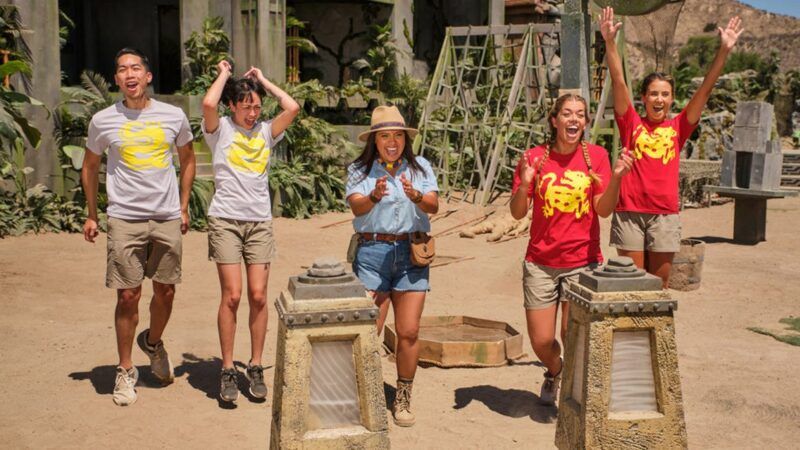Legends of the Hidden Temple: the Reboot Nobody Asked for or Wanted
This Nickelodeon nostalgia is strictly for the millennials—and nobody else.

Legends of the Hidden Temple. The CW. Sunday, October 10, 8 p.m.
Legends of the Hidden Temple began life nearly 30 years as a kiddie game show on the Nickelodeon Network. Then it morphed into a TV movie, also on Nickelodeon. From there it became a board game. And now, to my horror, it's a being presented as a competition game for adults on The CW. If we ever have a Scopes trial on the existence of devolution, Legends of the Hidden Temple is going to be Exhibit A.
I hope my use of the word "adult" a few sentences back didn't improperly arouse your hopes. (Jejune wordplay fully intended.) Nobody's competing to be the first to complete an act of fornication in a den of snakes or anything like that. No, this version of Legends has the same silly stunts as all the others—the same soporifically juvenile dialogue. It even has the same stone-face talking head Olmec (you doubtless remember him from the Patty Hearst trial), delivering the same stentorian warnings that contestants are about to be slaughtered by hordes of vampire bats, which, sadly, turn out to be as false as ever.
The CW apparently thinks millennials, dizzy with childhood nostalgia, will flock to Legends; I think they'll react more like baby boomers taking a long swallow of Boone's Farm Strawberry Hill: You mean we actually drank this swill?
Legends aspires to be a sort of game version of Raiders of the Lost Ark, except without Steven Spielberg, Harrison Ford or any of those playful Nazis. It consists of teams of two contestants each taking turns racing around a tacky mockup of a Mayan temple for an hour, trying to recover a lost ball from the ancient Mayan game pok-ta-pok. This requires a lot of throwing stuff, collecting things, falling down and imparting such wisdom to their partners as "Girrrrrrrl power!"
The contestants seem 20ish until they speak, when the show's Nickelodeon DNA is fully exposed. In the pilot episode, one pair hails from a punk rock band, one is composed of ex-cheerleaders, and one is a couple of party girls "playing to make our rent." The grand prize is a penurious $25,000 split between the two teammates, "a king's ransom," according to one of the hosts. Maybe in Elbonia. In the 1950s.
Eventually, one of the teams wins. (Don't take this too hard, but I'm not allowed to tell you which one, even if I say "spoiler alert" first.) It is a moment of extraordinary gravitas. "Our time here on Legends of the Hidden Temple has definitely been relatable to a journey in life," solemnly declares one of the players. That is indisputably true, if your life consists mostly of firing slingshots at cutouts of birds, chasing plastic balls around with sticks, mixing fake poison, being chased by giant spiders made of pipe cleaners, and throwing knives at paintings of animals.
For the rest of us, it might help if Legends of the Hidden Temple introduced a little more anthropological authenticity. Pok-ta-pok was a real Mayan game, it's true. But what nobody mentions in Legends is that in the Mayan version of the game, the losers were put to death. Talk about the thrill of victory and the agony of defeat.


Show Comments (32)